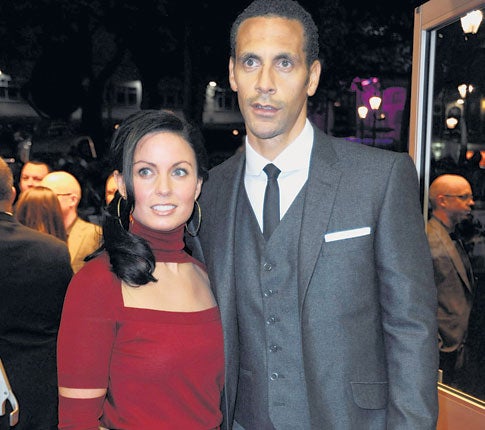Ferdinand anger over kiss'n'tell newspaper story

Footballer Rio Ferdinand told the High Court yesterday of his anger over a "kiss 'n' tell" story published when he held the England captaincy.
The 32-year-old Manchester United star, who has three children with wife Rebecca, has sued over the April 2010 Sunday Mirror article in which Carly Storey revealed details of their 13-year relationship. He is seeking substantial damages, including aggravated damages from MGN Ltd , for misuse of private information.
Ferdinand told Mr Justice Nicol that he felt "angry and upset" when he learnt two weeks ago that Ms Storey – who has provided a witness statement but is currently abroad – had been paid £16,000 by the newspaper.
His QC, Hugh Tomlinson, asked whether, as had been suggested, he was really bringing the action to protect his reputation which he had spent some time "polishing" for financial reasons.
Ferdinand answered: "No, I just thought a line needs to be drawn. There comes a time to say 'no' and this is the time."
MGN claims it was in the public interest to run the story about Ferdinand who, in February 2010, replaced John Terry as England captain before Terry was reinstated by manager Fabio Capello this year.
Mr Tomlinson said that the story was about "what is alleged to be an affair".
It was not disputed that Ferdinand and Ms Storey first met as teenagers in the 1990s and had at one time been close, but had drifted apart even before Ferdinand moved to Leeds United in 2000.
At the time of the article, said counsel, they had not met for a number of years, but exchanged text messages from time to time. Their last contact was in February 2010, when there was an exchange of texts, but no further contact.
A few weeks later, Ms Storey contacted Max Clifford and arranged to sell her story.
The issue at the heart of the case is whether the newspaper was justified in publishing because the over-riding public interest was such that its Article 10 rights to freedom of expression trumped Ferdinand's Article 8 privacy rights of the Human Rights Act.
The hearing continues.
Subscribe to Independent Premium to bookmark this article
Want to bookmark your favourite articles and stories to read or reference later? Start your Independent Premium subscription today.

Join our commenting forum
Join thought-provoking conversations, follow other Independent readers and see their replies